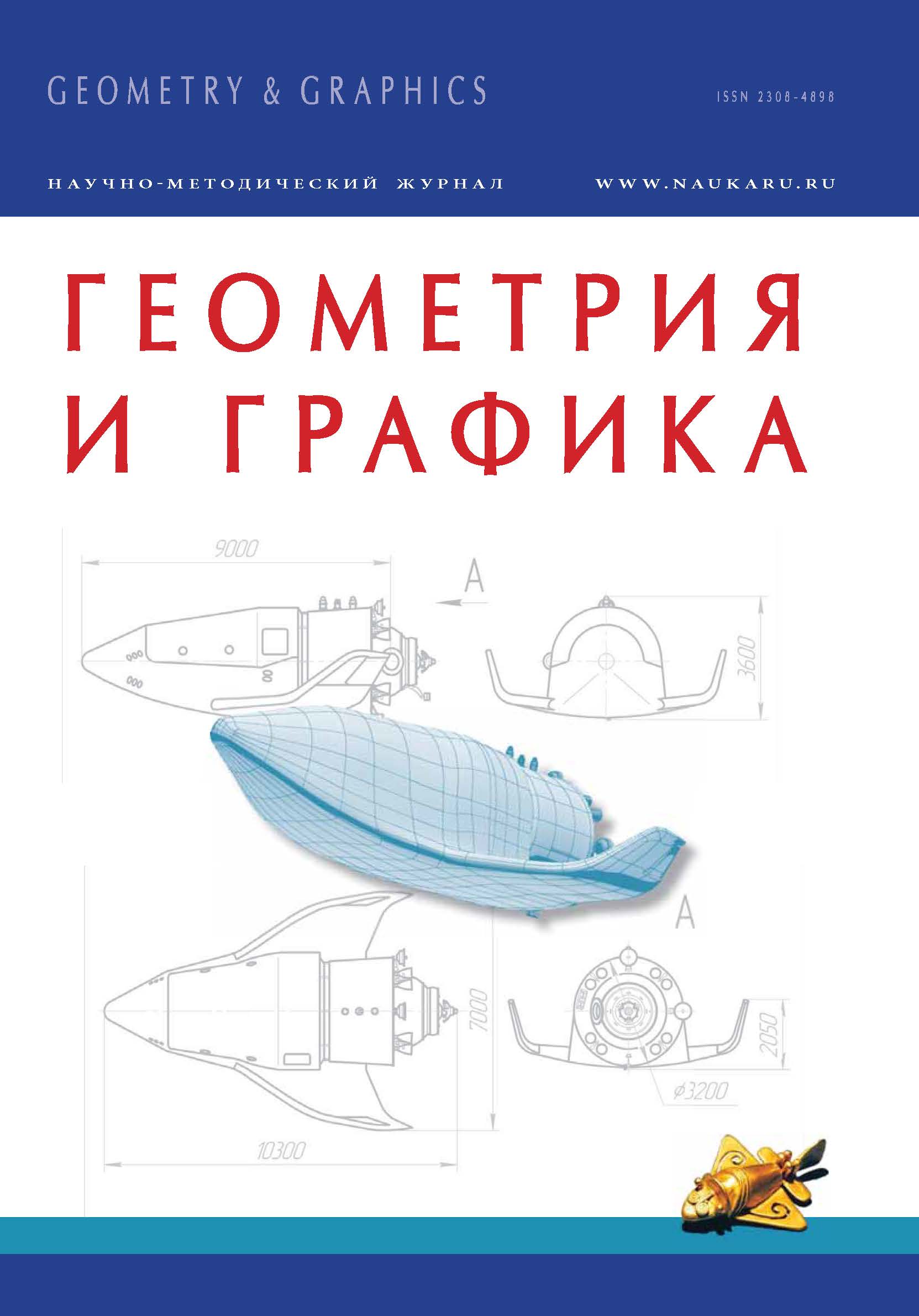This article reveals the essence of the problems of development of spatial imagination is a fundamental factor in the professional competence of a specialist engineer associated with low spatial imagination on the one hand and the lack of an integrated approach to solving this problem. Existing solutions in the system of higher technical education do not reflect a systemic vision of the development of spatial imagination of students as a priority direction of development of the creative qualities of students. The authors focus their research attention on solving the problem of the development of spatial thinking, aims to improve achievement in the study of graphic disciplines. Scientifically developed model of the development of spatial imagination in the system of higher technical education on the basis of current knowledge about the psychological characteristics of a person, we have not identified. The problem of development of spatial imagination in teaching descriptive geometry in higher technical educational institutions remains open to theoretical interpretation and experimental study. We believe the lack of integration with modern scientific data, the lack of a systematic vision for tackling the development of spatial imagination leads to the fact that students of technical universities face serious difficulties in the learning process, are unable to develop professional competence. Presents revealed the way to solve pedagogical problems in the conditions of intensification of educational process at the Department of descriptive geometry, as it is graphic activity contributes to the development of spatial imagination with the use of rational methods of teaching. The solution is based on pedagogical modeling, in which developed interactive educational content a teacher of descriptive geometry, which is the practical embodiment of the modern development of pedagogy in the development of skills and creative abilities of students. In interactive educational content includes methods of influencing students to enhance perceptions of educational information with the individualization of the educational trajectory: a channel on YouTube, sites, teachers, e-scientists allowances made in the format of lectures.
spatial imagination, professional competence, students of a technical college, perception, pedagogical modeling, interactive educational content, graphic activity.
Переход на новые образовательные стандартыизменяет подход к развитию профессиональных компетенций инженеров. Это выдвигает на первый план такую составляющую квалификационных характеристик, как творческие качества, когда студенты становятся способными генерировать и воплощать новые оригинальные идеи, решать нестандартные задачи. Поэтому одним из важнейших требований при обучении студентов в высших технических учебных заведениях должно стать развитие важного компонента творческой деятельности – пространственного воображения [2; 4; 8; 9].
Особенно остро данная проблема стоит на первом курсе при преподавании начертательной геометрии, так как этот предмет требует способностей к динамическим преобразованиям исходных образов, которые у студентов развиты недостаточно.
1. Ageev V.N., Drevs Ju.G. Elektronnye izdaniya uchebnogo naznacheniya: koncepcii, sozdanie, ispol´zovanie [Electronic publications for educational purposes: concept, creation, use]. Moscow, MGUP Publ., 2003.
2. Arcihovskaja-Kuznecova L.V. O «golovolomnosti» nachertatel´noy geometrii [Puzzles of Descriptive Geometry]. Geometriya i grafika [Geometry and graphics]. 2014, v. 2, i. 3, pp. 29-33. DOI:https://doi.org/10.12737/6523. (in Russian).
3. Gergej T., Mashbic E.I. Psihologo-pedagogicheskie problemy effektivnogo primenenija komp´jutera v uchebnom processe [Psychological and pedagogical problems of effective use of the computer in the learning process]. Available at: http:www.voppsy.ru/issues/14.04.2007.
4. Gornov A.O., Usanova E.V., Shacillo L.A. Bazovaja geometro-graficheskaya podgotovka na osnove 3D-elektronnyh modeley [Basic geometrical graphic preparation based on 3D-electronic models]. Geometriya i grafika [Geometry and Graphics]. 2014, v. 2, i. 3, pp. 43-49. DOI:https://doi.org/10.12737/6524. (in Russian).
5. Dahin A.N. Pedagogicheskoe modelirovanie [Pedagogical modeling]. Novosibirsk, NIP-KiPRO Publ., 2005.
6. Lagunova M.V. Sovremennye podhody k formirovaniju graficheskoj kul´tury studentov v tehnicheskih uchebnyh zavedenijah [Modern approaches to the formation of graphic culture of students in technical schools]. Novgorod, VGIPI Publ., 2003.
7. Novozhilova S.A., Egorycheva E.V. Informatsionnoe obespechenie v sovremennykh tekhnologiyakh obucheniya graficheskim distsiplinam. [Information support of modern technologies of training to graphic disciplines]. Geometriya i grafika [Geometry and Graphics]. 2013, v. 1, i. 3-4, pp. 33-35. DOI:https://doi.org/10.12737/2130. (in Russian).
8. Salkov N.A. Iskusstvo i nachertatel´naya geometriya. [Art and descriptive geometry]. Geometriya i grafika [Geometry and Graphics]. 2013, v. 1, i. 3-4, pp. 3-7. DOI: https://doi.org/10.12737/2123. (in Russian).
9. Salkov N.A. Kurs nachertatel´noy geometrii Gaspara Monzha. [The course of descriptive geometry Gaspard Monge]. Geometriya i grafika [Geometry and Graphics]. 2013, v. 1, i. 3-4, pp. 52-57. DOI:https://doi.org/10.12737/2135. (in Russian).
10. Temerbekova A.A., Belokopytova M.Ju. Pedagogicheskoe uslovija formirovanija professional´nyh kompetenciy budushhego uchitelya matematiki [Pedagogical conditions of formation of professional competence of the future teacher of mathematics]. Informaciya i obrazovanie: granicy kommunikacii INFO’14: sbornik nauchnyh trudov [Information and education: the boundaries of communication INFO´14: collection of scientific papers]. Gorno-Altajsk, RIO Gorno-Altajskogo gosuniversiteta Publ.., 2014, p. 308.
11. Ten M.G. Komp´juternaja grafika pri vypolnenii zadanij po nachertatel´noj geometrii i inzhenernoy grafike. Videouroki: AutoCAD dlya zaochnikov [Computer graphics when performing tasks on descriptive geometry and engineering graphics Screencast: AutoCAD for external students]. Novosibirsk, NGASU (Sibstrin) Publ., 2012.
12. Usanova E.V. Psihologo-pedagogicheskie aspekty geometrograficheskoy podgotovki v tehnicheskom vuze s ispol´zovaniem media-tehnologiy i SAD-sistem [Psychological and pedagogical aspects of geometric-graphic preparation of a technical college in using media technologies and CAD systems]. Geometriya i grafika [Geometry and Graphics]. 2013, v. 1, . 1, pp. 59-62. DOI:https://doi.org/10.12737/478. (in Russian).
13. Jakimanskaja, I.S. Psihologija matematicheskoj dejatel´nosti uchashhihsja pri obuchenii geometrii [Psychology of mathematical activity of pupils in teaching geometry]. Metodika obuchenija geometrii [The technique of training of geometry]. I. 4. Moscow, 2004, p. 34.






